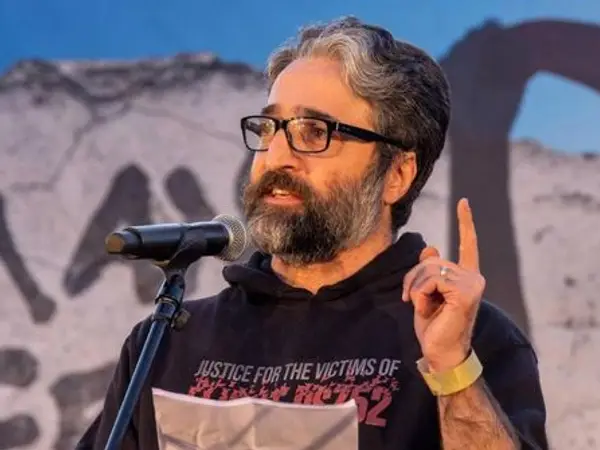The resignation of Hamed Esmaeilion from the Alliance for Freedom and Democracy in Iran has sparked bitter arguments between monarchists and his supporters.
In a post entitled “Report to the People” Friday, Canada-based activist Esmaeilion announced that he has left the alliance. The council consisted of the exiled Prince Reza Pahlavi, Nobel peace prize laureate Shirin Ebadi , US-based author, journalist and women’s rights activist Masih Alinejad, actress and activist Nazanin Boniadi and Secretary General of the Kurdish Komala Party Abdullah Mohtadi and Esmaeilion.
Boniadi recently deactivated her social media accounts without any explanation and appears to have withdrawn from the alliance too. Alinejad, Mohtadi, and Ebadi have so far not commented on Esmaeilion’s resignation.
The alliance announced its existence in a February event at Georgetown University and issued its charter, the Mahsa Charter, in early March and its members said they had agreed on “minimal positions” that could create the most consensus among the opposition.
Esmaeilion said he joined the opposition in exile council hoping to help create a platform for dialogue and cooperation among various opposition factions but the lack of democracy and transparency in the council and the “domination” of one member over the others disillusioned him.
He claimed that he had tried to keep away from “conflicts, pressures and illogical demands” but was impeded by “pressure groups from the outside” who kept trying to impose their own views on the coalition by “undemocratic methods".
Supporters of Esmaeilion, Alinejad, and Mohtadi have long been accusing the supporters of the exiled Prince of harassment on social media and efforts to defame them. Prince Reza Pahlavi has on some occasions advised his supporters to be more tolerant of others but the disputes and attacks on social media only got worse. They often accuse Prince Reza Pahlavi’s supporters of trying to present the him as the only legitimate leader of the opposition.
Supporters of the Prince who call themselves ‘constitutionalists’ are staunchly against establishing a republic of any form in Iran, particularly federalism, seek the revival of a constitutional monarchy and the Iranian Constitution of 1906. They allege that others, Esmaeilion and Alinejad in particular, have views that will lead to the loss of Iran's national integrity.
Constitutionalists have been particularly angry recently because they believe that Esmaeilion and possibly Alinejad have prevented the Prince from including some opposition figures close to him in the coalition– particularly London-based journalist Amir Taheri, the US-based Amir-Hossein Etemadi, a member of the Frashgard group, and Germany-based musician and activist Shahin Najafi.
"Imposing opinions is not democratic, and the consensus of a group’s members, not just one member, is a precondition of a democratic movement," Esmaeilion wrote without naming Prince Reza Pahlavi directly while further suggesting that there have been efforts to “eliminate” others and impose certain views on others.
He also opined that the opposition abroad should only help to empower the people of Iran, their networks and organizations and that he would personally continue helping young pro-democracy Iranians abroad to organize and work on “unrestricted internet and several other projects” with them.
His critics respond that the six-member council was self-appointed, and no one got elected to block others from joining.
Some social media users have also suggested that the reason for Esmaeilion’s departure from the alliance at this time could have been his opposition to the Prince’s recent visit to Israel.
“Timelines are filled with Esmaeilion’s worthless tweet exactly when articles and tweets must focus on the important and taboo-breaking Israel visit of the Iranian monarch, Prince Reza Pahlavi, and the impact of this visit today and after the reclamation of Iran [from the Islamic Republic]. Isn’t it interesting?” one of the Prince’s supporters tweeted.
